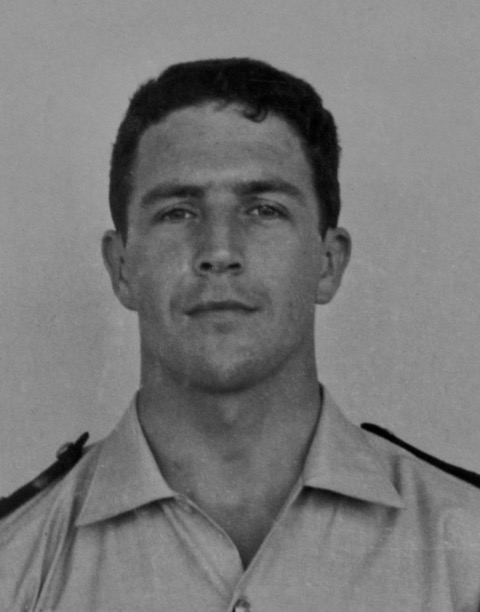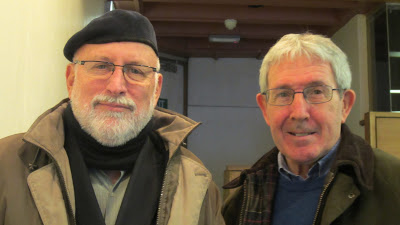The Great Adventure of my Life'
 Young Constable John McQuaid
Young Constable John McQuaid
For my latest posting I have to confess that I am about to take a personal and sentimental journey into my by now, extended past. I will perhaps remind you that I am now well embarked into my eighth decade but I can guarantee that I am sufficiently self-assured enough to realise that my mind is now replete with my memories; indeed, as we are occasionally informed, one's memory is frequently sharpened with the onset of what is now regarded as 'old age'. The spark for this particular memory jolt was a recent reminder that it was long ago in September of 1963 that I set off on the first great adventure of my life. Fifty years ago, as a single young police officer patrolling the streets of the capital city of my native country and with no particular skills or ambitions, I was about to fly from Heathrow airport on the inaugural flight of the then brand-new Boeing 707 jet airliner which had recently superceded the four-prop Bristol Brittanias, en route to the islands of Bermuda - the 'Somers Isles'.
Not only was this a very exciting moment, but to make it even sweeter I had only recently survived an extended and especially freezing winter, one which is currently being remembered for its severity and longevity - and there have been several recent newspaper articles recalling the subject as the coldest in living memory. After three months of patrolling with my pyjamas discreetly as possible worn under my uniform to counteract the Siberian conditions on perma-frozen pavements (we did walk then!) and later, coping with the resultant floods of a delayed, but rapid, Spring thaw, the idea of employment in an 'island paradise' seemed a most attractive option and it couldn't happen soon enough!
For me, my new life on the tiny island of Bermuda and its 55+,000 souls was to be all that a young man on the very cusp of adult life might have desired and to cut a protracted story short, it was within a couple of years of my existence there that I was to meet marry a young lady who had also arrived from Leicestershire. But the subtle beauty and immortal tranquility of life in those Atlantic islands are not to be the subject of my posting today. Whilst resident in Bermuda and marshalling my moments to fit between the necessary earning of a salary, the occasional pursuit of young maidens and the ever-present round of liquidrefreshment gatherings to attend, I did manage to find time to also become lured to a fascination with the rich history of the Islands relating to its colonial past, including the incarceration of mainly Irish and British convicts infamously housed in hulks at the waters edge who would assist in the creation of the infrastructure for the almost permanent existence of a British military garrison in this vitally important hub for the Atlantic shipping routes.
The origination and architectural styles of its many defensive forts and other old buildings were to absorb me, along with some of the rather diverse local customs. An archaeologist I certainly was not, but I might have been in another time! No, my curiosity in those distant days was limited to scratching around amongst the many ruins which exist there, to perhaps unearth artifacts which might have been abandoned long years ago, or sometimes to disturb the coral sand deposited underwater beneath the many bridges which link the western islands in the hope of discovering matter jettisoned by several generations of islanders or military personnel.
Well, as I now recall them, those halcyon days were enjoyed all of fifty years ago this year and my love of the Islands and the great majority of the people has never really diminished. A young family was started there and remains intact today, but we did not return until 2005 when I had a very emotional reunion with the 'rock'. I recall reflecting that it had all become rather overbuilt, but in the passage of modern times it has managed to retain much of its old endearing charm. In the rapidly ensuing years which have followed our departure I assiduously followed the comings and goings of all of the political and social meanderings of the Bermuda community, from it first dizzying heights of success in the boom tourism years to the present day with its tenuous grip on the re-insurance business and rumours of future disintegration in the wake of serious national debt.
A new Government has recently taken over and the supposition island-wide is for better days to be around the corner. Over my ensuing years of absence I have steadily acquired a fair knowledge of Bermuda's physical and social history and this almost totally due to the amazing evolution of the internet. I now keenly devour the pages of the Bermuda Maritime Museum information with great interest as a result of having visited the site during our return trip. In connection with this and as a taster and replenisher for things historic in Bermuda, I would always look forward to my copy of the weekly newspaper column, 'Heritage Matters', kindly forwarded by the author, the Museum's much respected founder and now Executive President, Dr. Edward Harris.
Who is this man?
Wikipedia, the free encyclopedia tells us that Dr. Edward Cecil Harris, MBE, JP, FSA is a prominent Bermudian archaeologist who is most famous for his Harris matrix which was developed in February 1973 and is now considered by some to be the "industry standard" for stratigraphic archaeology. This discovery was followed by a five-year investigation into archaeological practices which determined for him that the methods employed did not properly account for stratigraphy with the result that he would publish his findings in 1979 as 'The Principles of Archaeological Stratigraphy.'
While attending Columbia University School of General Studies in the United States, Harris spent the summers assisting on archaeological digs in Winchester, England and after graduating he continued his archaeological work, taking in sites in Bergen, Norway and along the Persian Gulf. In 1982, he became a Fellow of the Society of Antiquaries of London and in 1991 he became a Fellow at the John Carter Brown Library at Brown University. In 1997 he worked towards a PhD through the University of London while working on excavations in New Guinea.
Outside of academia, Dr Harris has been awarded the Palmetto Award by the Bermuda National Trust for his efforts in the historical preservation of several buildings in 1994. In Bermuda he has, since 1980, served as the Executive Director of the Bermuda Maritime Museum whilst also writing a history column entitled "Heritage Matters", for the local newspaper; he is also a frequent contributor to the annual 'Bermuda Journal of Archaeology and Maritime History' where he has served as its Editor.
The 'Bermudian' magazine also tells of Dr Harris's career to date in an excellent article entitled 'Dockyard'.
But what exactly does all of my preamble have to do with my posting? Well, imagine my surprise when, after e-mailing Dr Harris in January to thank him for another year's supply of 'Heritage Matters', I was to receive in return an e-mail from him informing me that, coincidentally, he was due to be in Leicester (my County capital) within a few days as an attendee at a symposium at the University in that city. He suggested that as I lived not far away we could perhaps meet and maybe, I might also attend a couple of the presentations.
Ed and I at Leicester

Suffice to say that the following Saturday, a cold and frosty day, I took the 11.36 train to Leicester railway station and by 12 noon precisely I was sitting in the bar-lounge of the Belmont Hotel in De Montfort Street anticipating the good doctor's arrival. We had never before met - and within five minutes he duly arrived, instantly recognisable from photographs complete with his scholarly sun-bleached beard; over soft drinks we chatted mainly about our shared love of Bermuda and archaeological matters relating to that area of which we both had knowledge. Edward, or 'Doctor Ed', as he is fondly known by a large coterie of enthusiastic practitioners in the world of underwater archaeology, proved to be a charming and welcoming host.
At the time I was living in the Islands I imagine that he was either skulking around the ruins of the several forts which dot the landscape, or possibly, he was attending a seat of learning somewhere with his dream of being an archaeologist growing in his mind. Of course he was to go on to achieve world recognition for his discovery of the 'Harris Matrix' which he invented in 1973 and for the first time provided archaeologists with a means to view stratigraphic sequences in diagram form. It has since been adopted by professionals worldwide. I am delighted that I took the opportunity to meet a very interesting and obviously intelligent man, someone who has achieved so much for his country and his fellow archaeologists through his passion for history and the way that things were created.
The Symposium.
In an un-heated lecture theatre of Leicester University that chilly winter afternoon - myself wearing my overcoat and gloves and Ed with his signature beret, top-coat, scarf and a discreet snood placed around his neck - I was soon warmed and beguiled by knowledgeable people explaining the art of examining and recording the remains of and artifacts from the numerous wrecks which litter the ocean floor, especially around the Islands of Bermuda.
I was already well informed on the wreck of the 'Sea Venture' which was caught in a violent hurricane in 1609 bringing the first permanent settlers to the uninhabited rocks. I also enjoyed listening to a detailed account of the raising and restoring of the 'Mary Rose' in England followed by a detailed preamble through the recently re-visited excavation of the remains of the 'Warwick' which has lain for many years at the bottom of Castle Harbour in Bermuda, a wreck which continues to provide exciting new finds for the underwater enthusiasts, notwithstanding the wanton damage already caused scrap collectors.
Whither the fates ...?
So that was my special day, one I shall always remember and all thanks to the kindness of Dr Harris for finding the time to stir my memory. I wish him well in the next few years and hope that the Museum and all things historic in the Islands which he has strived to put together, are not only maintained, but will continue to go from strength to strength. The nascent government may well struggle for funds for a long time to come yet, but it is plain common sense to understand that the history of the Bermuda Islands which is already being preserved for future generations, is not allowed to drift into decay. To those people who have never visited the Islands I would say, 'give it a go, you will not regret it - and don't don't forget to visit the Maritime Museum at historic Dockyard!"
CLICK HERE for John's article in our "Then and Now" column.